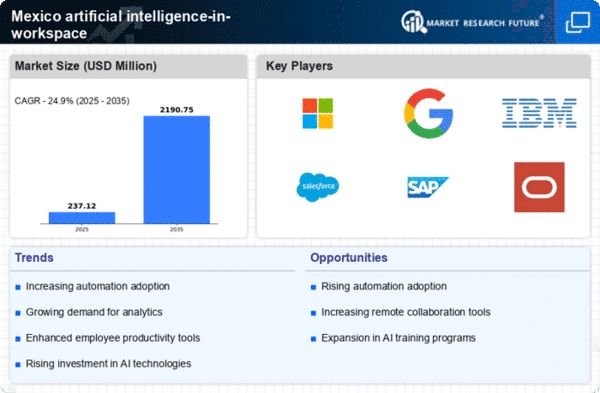Rising Demand for Automation
The artificial intelligence-in-workspace market in Mexico is experiencing a notable surge in demand for automation solutions. Businesses are increasingly recognizing the potential of AI to streamline operations, enhance productivity, and reduce operational costs. According to recent data, approximately 60% of companies in Mexico are investing in AI technologies to automate routine tasks. This trend is driven by the need for efficiency and the desire to remain competitive in a rapidly evolving market. As organizations seek to optimize their workflows, the integration of AI tools becomes essential. The artificial intelligence-in-workspace market is thus positioned to grow significantly as more enterprises adopt these technologies to facilitate automation and improve overall performance.
Growing Focus on Cybersecurity
As the digital landscape evolves, the artificial intelligence-in-workspace market in Mexico is witnessing a heightened emphasis on cybersecurity. Organizations are increasingly adopting AI-driven security solutions to protect sensitive data and mitigate cyber threats. With cyberattacks becoming more sophisticated, approximately 55% of businesses in Mexico are integrating AI technologies to bolster their cybersecurity measures. This trend reflects a broader recognition of the importance of safeguarding digital assets. The artificial intelligence-in-workspace market is thus expected to grow as companies prioritize AI solutions that enhance their security posture and ensure compliance with regulatory standards.
Investment in Workforce Upskilling
The artificial intelligence-in-workspace market in Mexico is significantly impacted by the growing investment in workforce upskilling. Companies are recognizing the necessity of equipping their employees with the skills required to effectively utilize AI technologies. Recent reports suggest that around 65% of organizations in Mexico are implementing training programs focused on AI and data analytics. This commitment to upskilling not only enhances employee capabilities but also fosters a culture of innovation within organizations. As businesses strive to maximize the benefits of AI, the artificial intelligence-in-workspace market is likely to flourish, driven by a skilled workforce adept at leveraging advanced technologies.
Enhancing Data-Driven Decision Making
In Mexico, the artificial intelligence-in-workspace market is increasingly influenced by the need for data-driven decision-making. Organizations are leveraging AI to analyze vast amounts of data, enabling them to derive actionable insights and make informed choices. This shift towards data-centric strategies is evident, with studies indicating that 70% of Mexican firms are prioritizing data analytics in their operations. The ability to harness AI for predictive analytics and real-time data processing is transforming how businesses operate. Consequently, the artificial intelligence-in-workspace market is likely to expand as companies invest in AI solutions that enhance their decision-making capabilities and drive strategic growth.
Increased Collaboration with Tech Startups
The artificial intelligence-in-workspace market in Mexico is benefiting from increased collaboration between established companies and tech startups. This trend is fostering innovation and accelerating the development of AI solutions tailored to specific industry needs. Approximately 50% of large enterprises in Mexico are partnering with startups to co-create AI applications that enhance operational efficiency. Such collaborations are instrumental in driving technological advancements and expanding the capabilities of AI in the workplace. As this ecosystem of innovation continues to grow, the artificial intelligence-in-workspace market is poised for substantial growth, fueled by the dynamic interplay between established firms and emerging tech innovators.
















